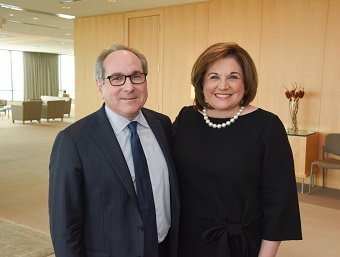2018 Sweetheart Ball raises record $2.4 million for UTSW heart research and care
By Sharon Reynolds
The 2018 Sweetheart Ball marked a 37-year partnership of giving that has been instrumental in UT Southwestern’s growth and development in becoming one of the nation’s top-ranked cardiology programs. Last year’s gala raised a record-breaking $2.4 million, including $1.2 million from the event and $1.2 million in matching funds that have been provided to UT Southwestern every year since the event’s inception.

President of UTSW, Dr. Daniel K. Podolsky and 2018 Sweetheart Ball Chair, Lee Ann White
Founded in 1981 by a group of civic-minded women committed to battling the nation’s leading cause of death, the Sweetheart Ball has raised almost $30 million for cardiovascular research and care at UT Southwestern.
“I was honored to have been given the opportunity to help others live a healthier life,” said Lee Ann White, 2018 Sweetheart Ball Chair. “We are all too familiar with the toll that heart disease takes on our loved ones. When I was a teen, my beloved father suffered from heart disease and had a heart attack. If he had access to the advances in cardiovascular care that exist today, his quality of life would have probably been much different. Together with the passionate supporters of the Sweetheart Ball, we are helping to change the future for other families.”
“We are grateful for the Sweetheart Ball’s support of our commitment to advancing cardiovascular research programs and care at UT Southwestern,” said Dr. Daniel K. Podolsky, President of UT Southwestern. “Their tradition of generosity speaks to the Dallas community’s confidence in our efforts to conquer heart disease in its various forms. The unwavering commitment of the Sweetheart Ball has already touched countless lives and continues to propel groundbreaking discoveries in cardiac care.”
The Sweetheart Ball has supported UT Southwestern research that has led to discoveries and transformational change in the ways doctors diagnose, treat, and prevent heart disease.
Scientists and physician-researchers have:
|
|
• Discovered how cholesterol levels are controlled, leading to the development of the most prescribed types of medication in the world – statin drugs – that have lowered the risk of heart attack by 50 percent.
• Identified the genes that control the growth of the heart in the fetus, setting the stage for new discoveries to prevent congenital heart disease.
• Improved heart transplant procedures, with UTSW ranking among the top five medical centers in the nation for long-term survival.
• Developed, patented, and tested new drugs to combat congestive heart failure.
• Defined the benefits of exercise on cardiac fitness and overall health.
• Inspired new approaches to prevent and treat cardiovascular and liver diseases through the Dallas Heart Study (DHS), which originated at UT Southwestern in 2000. The next chapter of the DHS – the Dallas Hearts and Minds Study (DHMS) – is now underway. It explores the underlying biology of healthy aging in a multiethnic cohort and will serve as a platform for new discoveries in understanding the aging process.
|
According to a 2019 report from the American Heart Association, nearly half of adults in the U.S. – 121.5 million – have some type of cardiovascular disease (CVD), including hypertension, which can lead to heart attack, heart failure, and stroke. CVD continues to be the leading cause of death globally. In 2016, CVD accounted for 840,678 deaths in the U.S. and more than 17.6 million deaths worldwide.
Dr. Podolsky holds the Philip O’Bryan Montgomery, Jr., M.D. Distinguished Presidential Chair in Academic Administration, and the Doris and Bryan Wildenthal Distinguished Chair in Medical Science.